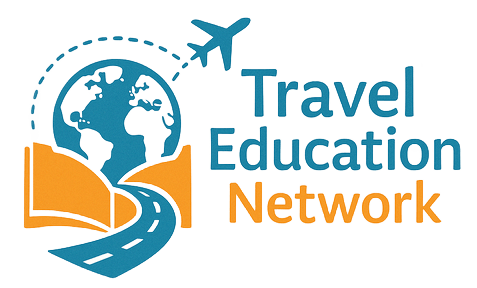What Education Do You Need to Be a Travel Agent
Dream of a career exploring the world and helping others do the same? Becoming a travel agent can make that dream a reality. While a high school diploma is the first step, certifications like the CTA and CTC, or even a degree in Hospitality and Tourism, can significantly boost your career. Discover how the right education can open doors to exciting travel agent opportunities. Learn how to gain the essential skills and knowledge needed to thrive in this dynamic industry. Start your journey today!
Important information

- A high school diploma or equivalent is the minimum requirement for aspiring travel agents.
- Higher education like an associate or bachelor’s degree in tourism or hospitality is often preferred by employers.
- Industry certifications (CTA, CTC, TAP) can significantly enhance job prospects and earning potential.
- Certificate programs offer a quicker route to entry-level positions, focusing on practical skills.
- Online courses provide flexible training for independent travel agent roles.
Understanding the Basic Educational Requirements for Travel Agents
While a high school diploma or equivalent is the baseline for becoming a travel agent, a competitive job market often favors candidates with stronger credentials. Many employers seek applicants with higher education, such as diplomas, certificates, or associate degrees from two-year colleges. These programs provide valuable training in travel logistics, marketing, and sales, giving graduates a distinct advantage in the demanding travel industry. Earning a certificate or degree can significantly boost your career prospects in this field.
High School Diploma: The Starting Point
Aspiring travel agents need at least a high school diploma or equivalent. This foundational education provides essential skills, such as communication and math, crucial for navigating the travel industry. It also prepares graduates for entry-level positions and further training opportunities within the field.
Higher Education and Certification Preferences
Employers highly value qualifications in the travel industry. A college degree, such as an associate’s or bachelor’s in tourism, hospitality, or a related field, is often preferred. Earning certifications like the Certified Travel Associate (CTA) or Certified Travel Counselor (CTC) can further boost your prospects. These credentials highlight advanced skills and can lead to higher-paying, more desirable positions, demonstrating a strong commitment to the profession.
Advanced Education Options for Aspiring Travel Agents
Formal Degrees
Formal degrees offer a strong foundation for a travel career. An associate or bachelor’s degree in Hospitality and Tourism Management provides a broad understanding of the industry, including business operations, international relations, and marketing strategies. You’ll also learn about geography, travel logistics, and customer service. While these programs typically take a few years to complete, they equip you with comprehensive knowledge.
Certificate Programs
Certificate programs offer targeted, practical training for a travel career. These programs are often shorter than degree programs and focus on developing essential skills like customer service, sales tactics, and using booking software. Some certificate programs even prepare you for industry certifications, such as the Travel Agent Proficiency (TAP) test.
Associate and Bachelor’s Degree in Hospitality and Tourism
Considering a hospitality and tourism degree? A career as a travel agent might be the perfect fit. Both associate and bachelor’s programs offer comprehensive training in the travel industry, covering business practices and customer service. An associate degree provides a solid foundation. A bachelor’s degree delves deeper, particularly beneficial for working with high-end clients or starting your own agency. For example, an Associate in Applied Science in Hospitality and Tourism offers a practical starting point. A Bachelor of Science in Hospitality and Tourism Management provides more advanced preparation for a thriving travel career.
Certificate Programs in Travel and Tourism
Travel and tourism certificate programs, typically lasting about six months, offer concentrated training in essential areas such as geography, sales, and customer service. This focused curriculum enhances graduates’ job prospects, with some programs even preparing students for certifications like the Travel Agent Proficiency (TAP) test. While a two- to four-year degree takes considerably longer, a certificate provides a quicker path, often sufficient for securing entry-level travel agent roles and launching a new career. This makes it an ideal choice for those seeking a swift entry into the travel industry.
Certificate Program (6 months)
- Focused training in geography, sales, and customer service.
- Prepares for certifications like the TAP test.
- Faster route to entry-level travel agent jobs.
Degree Program (2-4 years)
Traditional, longer program.
Specialized Training and Certification for Travel Agents
Enhance your travel agent career with specialized training and certifications. These credentials boost your credibility and open new opportunities. Consider these options: the Travel Agent Proficiency (TAP) test validates your industry knowledge, the Certified Travel Associate (CTA) certification demonstrates fundamental skills, the Certified Travel Counselor (CTC) designation signifies expertise, and the Certified Travel Industry Executive (CTIE) acknowledges leadership and management skills. Continuous learning is crucial to maintain these valuable certifications, ensuring ongoing career growth.
Travel Agent Proficiency (TAP) Test
The proctored Travel Agent Proficiency (TAP) test consists of 100 multiple-choice questions, covering travel industry fundamentals, sales techniques, and geography. A passing score of 70% or higher earns you the TAP certification, boosting your credibility and job prospects by validating your travel agent expertise. This rigorous exam also ensures agents meet industry standards, demonstrating your commitment to excellence and setting you apart from the competition.
Certified Travel Associate (CTA) and Counselor (CTC)
Boost your travel career with the Certified Travel Associate (CTA) or Certified Travel Counselor (CTC) designation. These credentials validate your expertise, build client confidence, and establish you as a dedicated professional. The CTA is an excellent starting point and often leads to the more advanced CTC. Both require passing exams and ongoing continuing education, but the advantages are substantial, potentially boosting both your career path and earning potential.
Certified Travel Associate (CTA)
A foundational certification ideal for new or aspiring travel professionals, validating core knowledge and skills.
Certified Travel Counselor (CTC)
A prestigious certification for experienced professionals, demonstrating advanced expertise and commitment to the industry.
Certified Travel Industry Executive (CTIE)
Ready to elevate your travel career? The Certified Travel Industry Executive (CTIE) program empowers experienced professionals like you with enhanced business management and leadership skills tailored to the travel industry. Achieving CTIE certification not only showcases your expertise but can also unlock top-tier travel career opportunities, proving your leadership potential.
Alternative Paths to Becoming a Travel Agent
Online courses offer a flexible path to becoming an independent travel agent, allowing you to learn at your own pace. These courses cover essential topics:
- travel logistics,
- customer service,
- effective sales techniques.
As an independent agent, you have options:
- work autonomously,
- partner with a host agency.
This gives you control over your schedule and allows you to specialize in niche travel markets. While a formal degree isn’t required, certifications (like the TAP test) enhance your credibility and job prospects.
Beyond theory, online courses provide practical training in:
- booking flights,
- crafting itineraries,
- understanding diverse cultures and destinations.
This independent career path offers great flexibility, but also demands self-discipline and strong marketing abilities.
Online Courses and Independent Travel Agent Roles
Dreaming of a career as a travel agent? Online courses offer the flexibility to learn at your own pace, paving the way for an independent career with true autonomy. As your own boss, you’ll manage every aspect of your business.
These courses cover essential topics:
- travel industry insights,
- customer service skills,
- marketing strategies,
- booking system proficiency.
Comprehensive training programs and online courses empower aspiring agents with the necessary skills for success. Independent agents enjoy these added perks:
- working from home,
- setting their own hours,
- building a thriving travel career.















